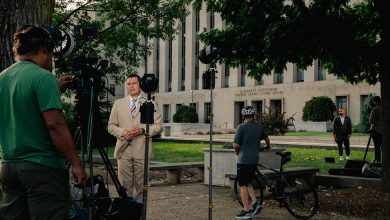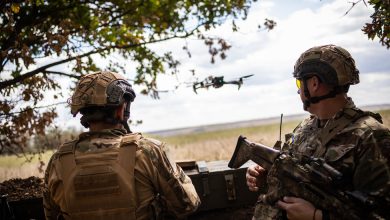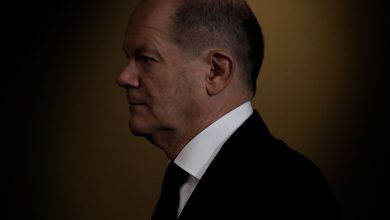Macron Tries to Avert a European War and Reshape European Security

PARIS — The standoff with Russia over Ukraine enters a critical phase this week. The United States has snapped NATO to attention and moved forces east. Moscow has readied still more forces on the Ukraine border. But beneath those tensions, diplomatic avenues are being feverishly explored and the outlines of potential solutions, still amorphous, may be taking form.
President Biden meets Monday with Chancellor Olaf Scholz, and President Emmanuel Macron of France, at the same time, will visit his Russian counterpart, Vladimir V. Putin, in Moscow before traveling to Kyiv.
With the Biden administration staking out a hard line, Germany lying low, and Mr. Putin seemingly determined to force a solution to Russia’s security grievances, it is Mr. Macron who has positioned himself at the center of the diplomacy in Europe. To Moscow, he is a “quality interlocutor,” as Mr. Putincalled Mr. Macron, according to a senior official in the French presidency, speaking on the condition of anonymity in keeping with French government practice.
For Mr. Macron the chance to lead the effort to create a new European security architecture has placed him front and center on perhaps the biggest stage of his presidency, just two months before elections. It has given him an opportunity to step into a larger leadership role for all of Europe and to put some flesh on his sometimes grandiose visions for a Europe allied with, but more independent of, the United States.
“Do we want a Russia that is totally aligned with China or one that is somewhere between China and Europe?” Bruno Le Maire, the French economy minister, who is very close to Mr. Macron, said on Friday as Russia and China declared “no limits” to their friendship and called on NATO to “abandon its ideologized Cold War approaches.”
For France, the choreographed embrace of Mr. Putin and President Xi Jinping of China on the eve of the Beijing Winter Olympics was a demonstration of the ominous wider ramifications of the Ukraine crisis, as Mr. Macron embarks on several days of intense diplomacy.
The risks are as great as the potential payoffs for Mr. Macron. Solutions to the crisis seem fiendishly elusive for now, even if Mr. Putin has appeared less directly threatening toward Ukraine over the past week.
The French president has a double purpose: to stop the war that a massive Russian troop concentration at the Ukrainian border threatens; and to allay the festering Russian grievances that NATO’s expansion eastward in 1999 and 2004 provoked, with the eventual aim of integrating Russia in a new European security system that offsets its lurch toward China.
It’s a tall order, but Mr. Macron has never lacked for audacity. He will need to tread carefully. “There’s frustration in European countries, including Germany, with Mr. Macron’s tendency to forge ahead and then yell at them for not doing anything,” said Jeremy Shapiro, a former State Department official who is now the research director of the European Council on Foreign Relations. “That weakens him.”
French officials described in broad outline the twin approaches Mr. Macron would adopt in his meetings with Mr. Putin and President Volodymyr Zelensky of Ukraine.
The first is to use the Normandy Format — a grouping of France, Germany, Ukraine and Russia — to bolster the 2015 Minsk 2 agreement, a deeply ambiguous document that secured a cease-fire in eastern Ukraine but that has proved largely inoperable, not least because nobody agrees on its meaning.
Could some interpretation of the accord, involving the eventual powers of the breakaway Donbas region over national policy, go some way toward satisfying Mr. Putin’s insistence that Ukraine never join NATO, a demand the United States and its allies, including France, are adamant in rejecting?
The second, in close consultation with Mr. Biden, is to secure a concrete signal of de-escalation that reverses the Russian military buildup and, as a means to achieving that, explores what Mr. Putin’s ultimate “red line” is in the confrontation.
The senior official at the French presidency said the nucleus of the Western conflict with Mr. Putin lay “in the extension of NATO and the inclusion in it of countries from the former Soviet space,” which created “an area of volatility that has to be reduced.” He added that Mr. Putin had told Mr. Macron that he wanted “a conversation of substance” that goes “to the heart of the matter.”
In effect France appears to be saying that Mr. Putin’s demands, which include pushing NATO back out of formerly Soviet-controlled countries, cannot ever be satisfied but that getting “to the heart of the matter” involves acknowledgment that NATO expansion created permanent grievances with Russia even as it secured freedom for 100 million central Europeans.
No one believes that Romania, Lithuania and other states that joined an expanded NATO are ever going to leave it, or that NATO is ever going to abrogate its 2008 Bucharest statement that Ukraine “will become” a member of the alliance. But, as Turkey’s almost 60-year flirtation with the European Union illustrates, there are ways of turning a candidacy for membership of an organization into an indefinite holding pattern.
“We can take a step toward Putin, recognize he is not completely wrong,” said Justin Vaïsse, the former head of policy planning at the French foreign ministry who now heads the Paris Peace Forum.
The senior official at the French presidency said, “Ukraine is not a member of NATO and, to my knowledge, will not be for a while.”
Mr. Macron wants to explore whether American offers last month could be complemented by further confidence-building measures that permit a way out of the crisis.
The American proposal involved more transparency about missile deployment in Eastern Europe and a call for reciprocal commitments by both the United States and Russia to refrain from deploying missiles or troops in Ukraine. Mr. Putin has rejected the American response to his demands as inadequate.
“Conceivably the arms control offers of the other day could be combined with some sort of consultative mechanism for changes in NATO status, or some sort of moratorium on NATO expansion, or some creative interpretation of the Minsk agreement that gives a Donbas constituent assembly veto powers over what the government will do,” Mr. Shapiro, the former State Department official, suggested.
None of this appears likely, however, given Mr. Putin’s unprovoked direct threat to Ukraine, his annexation of Crimea, his invasion of Georgia in the short war of 2008 and his history of tearing up treaties when it suits him. The Biden administration, with muscular proactive diplomacy, has signaled it is in no mood for compromise.
Understand the Escalating Tensions Over Ukraine
A brewing conflict. Antagonism between Ukraine and Russia has been simmering since 2014, when the Russian military crossed into Ukrainian territory, annexing Crimea and whipping up a rebellion in the east. A tenuous cease-fire was reached in 2015, but peace has been elusive.
A spike in hostilities. Russia has recently been building up forces near its border with Ukraine, and the Kremlin’s messaging toward its neighbor has hardened. Concern grew in late October, when Ukraine used an armed drone to attack a howitzer operated by Russian-backed separatists.
Ominous warnings. Russia called the strike a destabilizing act that violated the cease-fire agreement, raising fears of a new intervention in Ukraine that could draw the United States and Europe into a new phase of the conflict.
The Kremlin’s position. President Vladimir V. Putin of Russia, who has increasingly portrayed NATO’s eastward expansion as an existential threat to his country, said that Moscow’s military buildup was a response to Ukraine’s deepening partnership with the alliance.
Rising tension. Western countries have tried to maintain a dialogue with Moscow. But administration officials recently warned that the U.S. could throw its weight behind a Ukrainian insurgency should Russia invade.
Mr. Putin, it often seems, is only the latest exponent of what Joseph Conrad called Russian officialdom’s “almost sublime disdain for the truth.”
Despite this, Mr. Macron, who knows that a Russian invasion of Ukraine would send gas costs spiraling higher at a time when the French electorate is angry about lost purchasing power, sees some potential in the Normandy Format. A first meeting last month ended with limited progress, a second meeting is scheduled soon, and a summit of French, German, Russian and Ukrainian leaders has been suggested.
The Minsk 2 agreement calls for a “decentralization” of Ukraine that confers “special status” on areas of the east now controlled by separatists, with the “specificities” to be agreed on “with representatives of these areas.”
Russia, in a creative interpretation of these “specificities,” has argued that they should include granting the elected representatives in these areas a veto on Ukrainian foreign policy decisions, including membership in NATO. In this way, Ukraine would effectively become part of Russia’s sphere of influence.
“This is not going to happen,” Dmytro Kuleba, the Ukrainian foreign minister, said last week. “Never.”
Mr. Zelensky, the president, has sounded more ambivalent. “If it is not NATO, then point to some other security guarantees,” he said last month. It was unclear what he had in mind.
The “security guarantees” offered by the Budapest Memorandum of 1994, in which Russia vowed to respect Ukraine’s existing borders and sovereignty, proved worthless.
Absent other avenues, the Normandy Format at least brings the parties together. Mr. Shapiro argued that it could help forge stability.
“Instability is the Russian strength. Stability is our strength,” he said. “NATO and the European Union expansion were a very powerful way to secure democracy in Eastern European countries. But we got out of it what we could. If you believe in the superiority of the Western economic and political model, as I do, stability makes that evident, and spheres of influence are a pretty good way to establish that.”
Mr. Putin, the French official said, “wants long-term visibility” on Ukraine and Europe. That appears to leave Mr. Macron playing a potentially dangerous game, trying to balance the “new European security order” he has said he seeks with his commitment to the United States and the NATO alliance.





